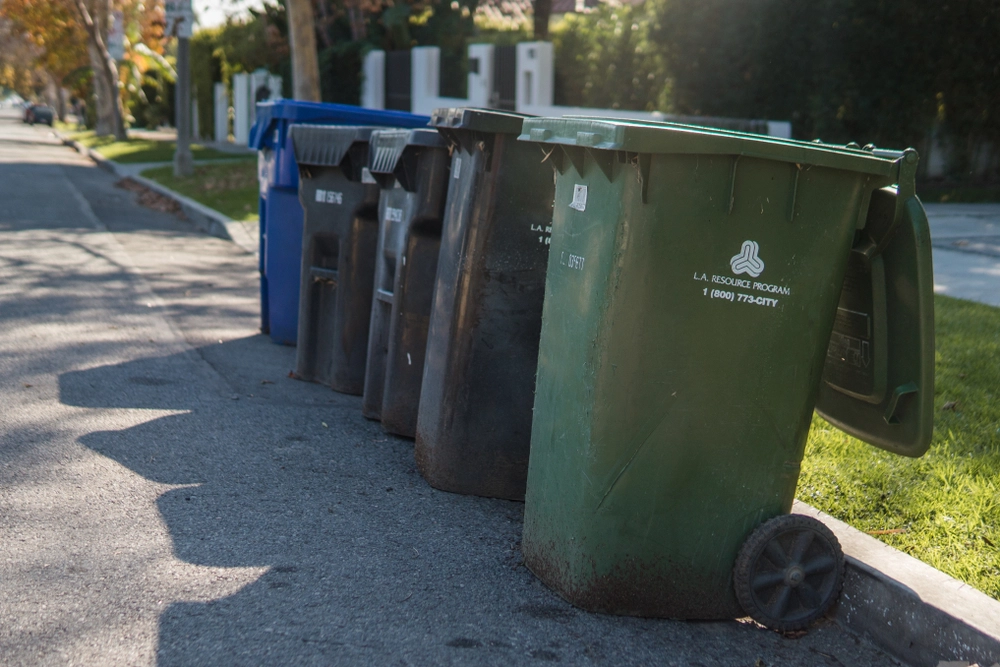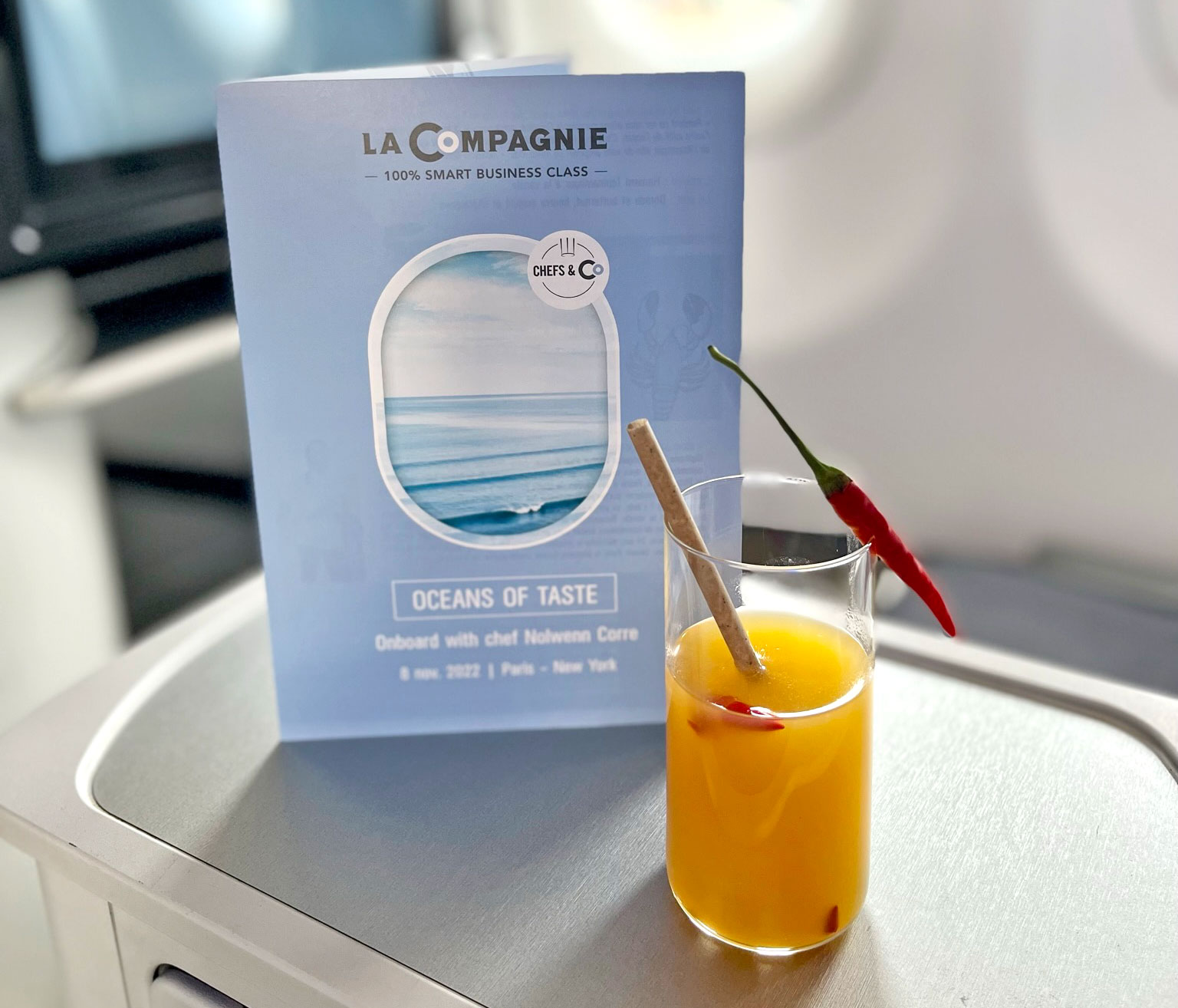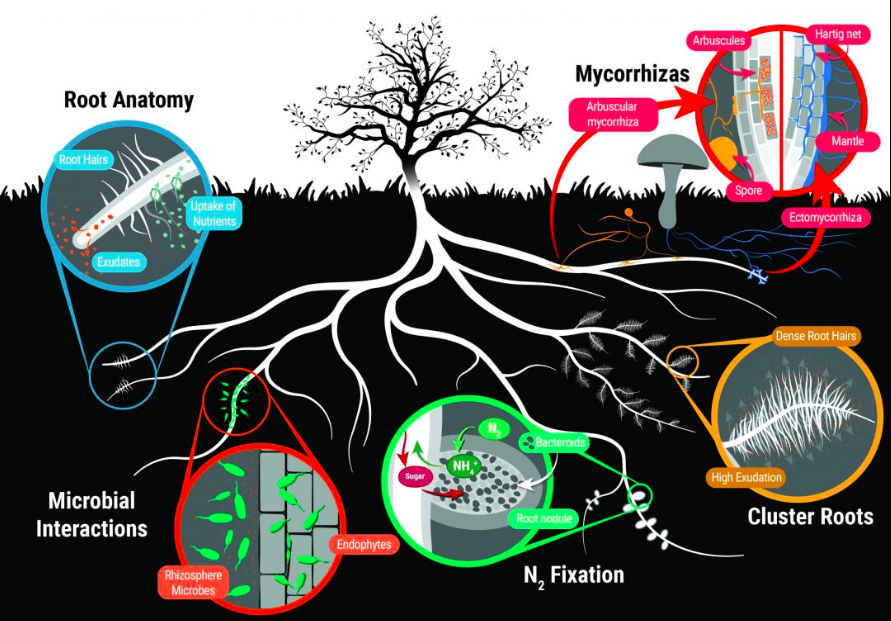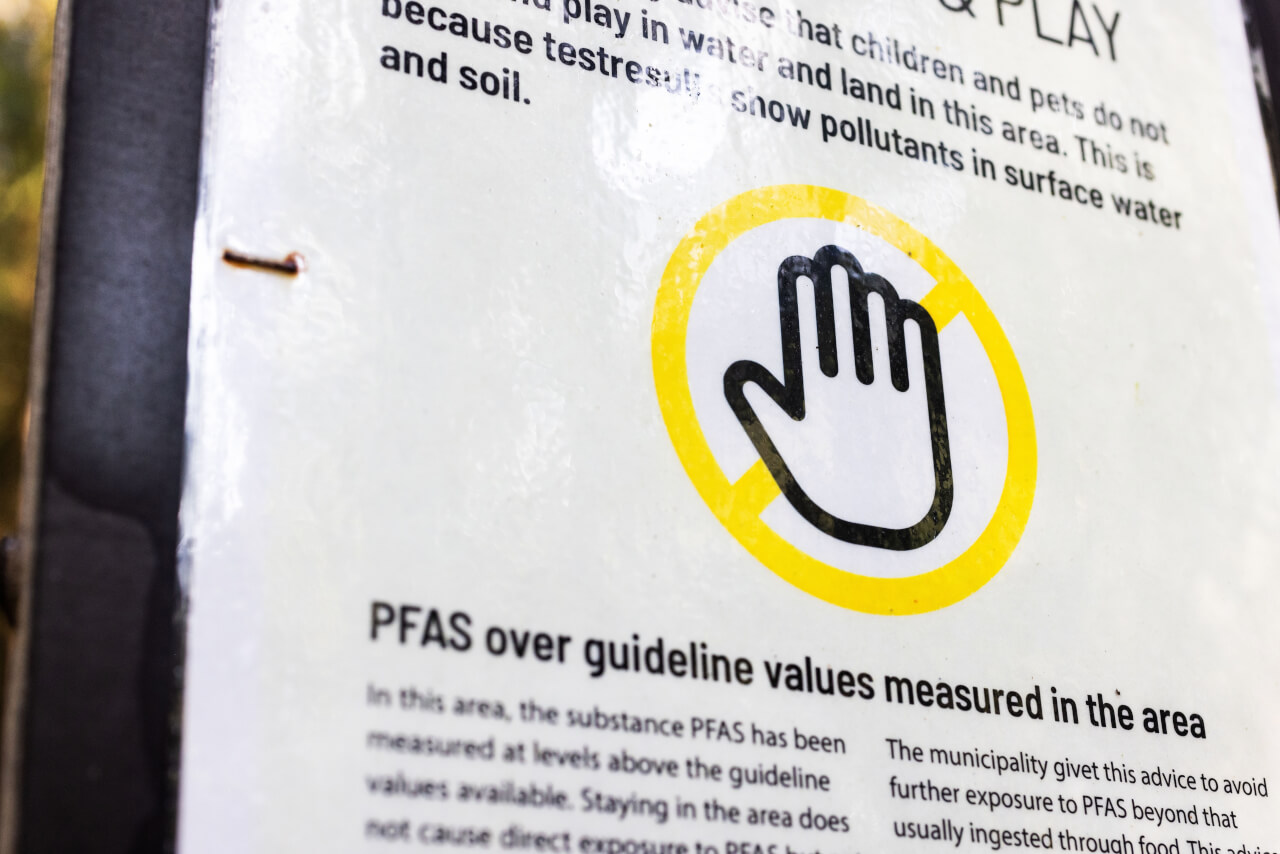[ad_1]
Roughly one quarter of all landfill waste within the US is meals. Should you add in issues akin to yard trimmings, newspapers and wooden merchandise, greater than half of all waste is made up of natural materials.
In a landfill, meals and natural supplies are dumped into the landfill, with extra waste regularly piled on prime, creating compacted, oxygen-deprived areas the place micro organism thrives to interrupt down the natural matter. The decomposition course of generates methane, a greenhouse gasoline. In line with the EPA, “municipal stable waste landfills are the third largest supply of human-related methane emissions within the US.”
Put one other manner: Nearly all of issues we casually toss into the trash could be composted, with large advantages for the planet.
Composting is a reasonably fundamental idea, though there are a number of methods to go about it. Basically, composting accelerates the decomposition course of by including natural matter to an oxygen-rich atmosphere after which letting the bugs and fungi that break down matter do their factor. There are small, backyard-scale composting setups with worms (often called vermicomposting), massive, industrial-sized bins that rotate the matter persistently to make sure the suitable airflow and all sizes in between. No matter technique you employ, ultimately, the tip result’s compost—a nutrient-rich soil that can be utilized as a soil modification.
Roughly 15 million American households have entry to a food-waste compost program, with about 400 packages unfold throughout 25 states. That’s about 12 p.c of households throughout the nation. If composting is a giant win for cities—taking waste out of landfills, producing fertilizer and fascinating residents within the recycling course of—why doesn’t everybody do it? Nicely, like most public works initiatives, it’s not that straightforward.
To be taught extra about which municipalities provide composting throughout the US and Canada—and so as to add your metropolis to our record—try our compost map right here.

The curbside pickup truck from Washington’s pilot program. Pictures submitted by the Metropolis of Washington, DC.
‘One dimension doesn’t match all’
So, what does it take to implement a brand new composting program? In 2017, Washington, DC’s Division of Public Works put collectively a survey to evaluate the feasibility of a compost program for native residents. There are numerous issues; on this case, it discovered that the primary impediment was processing capability. For a metropolis of about 700,000 individuals, the place does all of that waste really go?
The town simply didn’t have the area to divert waste from the landfill at the moment. Nonetheless, within the intervening years, industrial composting packages in DC-adjacent Prince George’s County have elevated, and different cities akin to Boston have began composting—a improvement that Rachel Manning, a program analyst inside Washington’s Division of Public Works, and her staff have watched with curiosity. Lastly, in August of 2023, seven years after its preliminary examine, Washington launched its pilot compost program.
The town now has about 10,000 households taking part within the pilot program, with common curbside pickup of compost, together with trash and recycling. Manning says the staff sends out common surveys to individuals to see how issues are going all through this system, which is scheduled to final for a 12 months. “One thing that’s fascinating to us is knowing that one dimension doesn’t match all,” Manning says of the problems which have popped up from resident responses. “Perhaps not everybody fills up a five-gallon bin, possibly some individuals need greater than 5 gallons…so there’s a little bit little bit of fascinated by what are the suitable sizes of those containers? What sort of [truck] fleets do we have to serve all these properties? Proper now, it’s not the identical dimension as our trash packer vehicles, as a result of we’re not servicing as many individuals. But additionally, meals has numerous moisture in it, so that you want a specific automobile for that. Additionally, [the Department of Public Works] has a aim to impress all of their fleet. So, we want to consider electrical autos, and what the capability is there.”
To date, Manning says this system has been successful. It has a couple of 70-percent adoption price amongst individuals and has diverted greater than 400 tons of waste from the landfill. The town additionally brings the compost again to residents (in the event that they ask for it) to make use of of their gardens, so there’s much more incentive for residents to compost. This summer time, when this system is scheduled to come back to an finish, Manning and the staff will consider shifting ahead with composting on a fair bigger scale.
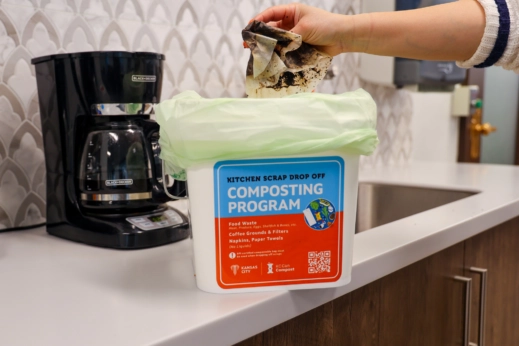
Pictures submitted by they metropolis of Kansas Metropolis, MO.
‘We’re prepared to pivot’
“I’m going to inform you a secret,” says Melissa Kozakiewicz, assistant metropolis engineer in Kansas Metropolis, Missouri. “I all the time begin with pilots, and utilizing the phrase ‘pilot,’ I can pivot and be versatile when issues are working and once they’re not….however we aren’t going to take it away.”
Kozakiewicz, who has beforehand constructed up a compost program in Jersey Metropolis, New Jersey, is now spearheading the compost pilot program in Kansas Metropolis. She’s hoping to copy a few of her earlier successes, notably in how she makes this system out there to residents. “It’s important to be actually deliberate and cautious with the way you introduce [a compost program]. You don’t need anyone to really feel such as you’re jamming one thing down their throat, as a result of then they’re out,” says Kozakiewicz. As an alternative, she works at a tempo with which the neighborhood is snug and integrates demonstrations at large public occasions, akin to a Fourth of July parade. That manner, residents get snug with composting as a part of their public life and is likely to be extra inclined to proceed doing it at dwelling.
Kansas Metropolis additionally doesn’t at present provide a curbside pickup of compost. As an alternative, its mannequin is a drop-off program. The town has 5 present drop-off areas, with 10 extra to come back across the metropolis this 12 months. Kozakiewicz says that helps stop contamination of waste, as a result of compost bins aren’t mendacity round subsequent to trash or recycling containers. If residents make a visit to a particular, designated location, it helps to bolster what that location is for. It additionally helps ward in opposition to one other frequent concern for cities: vermin and pests. “We now have one in all our drop-off spots inside Metropolis Corridor’s storage. It’s a publicly accessible area that anyone can use,” says Kozakiewicz, and the common foot site visitors permits for lots of suggestions if one thing’s amiss. “Should you name me and say ‘Hey, I used to be on the Metropolis Corridor storage, and it appears horrible,’ I can name anyone proper this minute to go test it out.” (Knowledge on adoption charges for composting are tougher to seek out, however research counsel that within the case of recycling packages, residents are extra prone to take part when the packages provide curbside pickup.)
Each Kansas Metropolis and Washington, DC, are experimenting with packages on the municipal stage and with only a portion of their residents up to now. However can these packages scale up? Latest state-wide laws is attempting to reply that query.
In Vermont, a state-wide meals scrap ban went into impact in 2020. Residents separate their meals scraps and both compost them in their very own properties, drop them off at a chosen station or join curb-side pick-up. The legislation additionally prioritizes lowering meals waste upstream, guaranteeing extra meals goes to meals banks or is was animal feed. On the time of implementation, Josh Kelly, supplies administration part chief on the state’s division of environmental conservation, instructed Vermont Public that state legislators had been engaged on lowering waste since 2012. “We now have had a state aim to have 50 p.c of the waste that we produce separated and recycled, reused or composted. And that aim has by no means been met in all of the years that it’s been in place.” Within the 12 months following the ban’s implementation, gross sales of yard composters in Vermont greater than doubled, and a survey final 12 months discovered that 61 p.c of Vermont residents felt a “ethical obligation” to maintain meals out of landfills (though the state remains to be not assembly that 50-percent aim).
California is hoping to see a few of that success, after it applied state-wide laws in January of 2022. The aim of the legislation, says Lance Klug, with CalRecycle’s workplace of public affairs, is to scale back the quantity of natural waste in landfills by 75 p.c and reroute 20 p.c of contemporary, unsold meals to Californians in want, each by 2025. The legislation requires all cities and counties within the state to implement packages to gather natural waste and enhance meals restoration from websites akin to grocery shops. To date, says Klug, this system is chugging alongside, though it’s run into points starting from COVID-related provide chain slowdowns to a slower adoption price than hoped for. Roughly 75 p.c of jurisdictions in California now have a composting program in place, and in 2022, about 200,000 tons of unsold meals was recovered and redistributed to people who wanted it. Nonetheless, as reported by the Related Press, it’s unlikely the state will meet its 2025 objectives.

Pictures submitted by they metropolis of Kansas Metropolis, MO.
‘Schooling can’t be understated’
Not everybody has a state or perhaps a metropolis supporting them within the effort to compost. However for some people, that doesn’t matter—they simply do it anyway.
For Bob Ferretti, that was no small feat. He’s the affiliate director of administrative companies at Yale College, which at any given time has about 25,000 college students, workers and school on the campus. That’s numerous waste.
About 15 years in the past, Ferretti and his staff started the method of determining easy methods to facilitate a composting program on campus—made harder by the truth that, on the time, town of New Haven, Connecticut, the place Yale is situated, didn’t have a program in place municipally. (At the moment, there’s nonetheless no residential program for would-be composters in New Haven. Nonetheless, town does mandate that if you’re a big enterprise, produce sufficient compost and are situated inside 20 miles of a compost facility, then you’re required to make use of it.) “There’s actually no composting infrastructure inside the state at an industrial scale,” says Ferretti. “There have been small natural operations inside native farms and issues like that, however nothing that might deal with the quantity we have been producing.”
At first, Ferretti remembers, Yale needed to rent vehicles to cart the compost every day from campus to a facility on the New York State border, which was just a few hours round-trip. It wasn’t the very best environmental resolution, Ferretti says, for an effort aiming to curb greenhouse emissions. “We did meet with town to try to provide you with one thing much more native,” says Ferretti. “I don’t suppose there was a ton of actual property out there for it.” Plus, says Ferretti, there have been questions on who would personal that sort of venture. Wouldn’t it be a municipally run program that solely serves Yale? A non-public program for the college however that makes use of native authorities? In the end, Ferretti and his staff discovered an industrial composter inside the state, solely about half-hour from campus, and partnered with it.
There have been some preliminary wins for the Yale venture. As college students who lived on campus principally lived in residence halls and ate at massive eating amenities, a lot of the waste was already centralized, making it more easy to gather than in a spread-out metropolis. However this was greater than a decade in the past, and Ferretti says that they had wanted to do numerous schooling to get everybody on board. “We did numerous waste stream audits for visible consciousness, you recognize, the place we dumped out baggage of trash throughout campus and had individuals in Tyvek fits sorting via and displaying individuals what’s in our waste stream in order that they turned conscious of how a lot may very well be diverted,” says Ferretti. “We’d have the scholars actively weigh plates after each meal, to see how a lot meals was scraped into this bucket, in order that they understand how a lot was being composted.” There have been nonetheless challenges with cross contamination, as silverware, latex gloves or different generic trash was simply dropped into the flawed container. “Schooling can’t be understated,” says Ferretti.
There’s so much to think about when beginning up a brand new compost program. Even when your municipality presents curbside trash and recycling assortment, including compost to the combo isn’t so simple as shopping for just a few extra vehicles and hiring some new employees. However with every new program that will get launched, there are extra examples of easy methods to make composting work for cities, cities and even personal entities of any dimension.
In Kansas Metropolis, Kozakiewicz says the essential factor to recollect is to not await issues to be excellent—you’ll be ready a very long time. “You’ve received to sort of push a little bit, utilizing the sources that you’ve got,” she says. “No one’s right here in constructing a brand new landfill.”
[ad_2]
Source link
